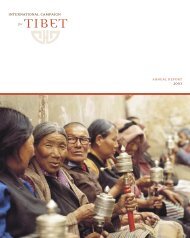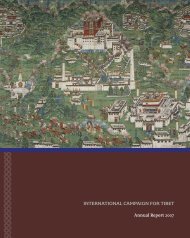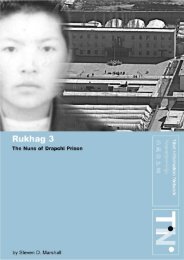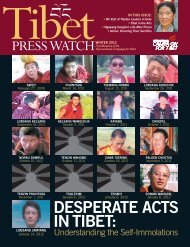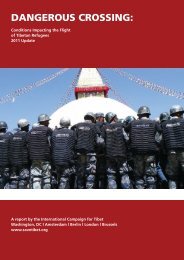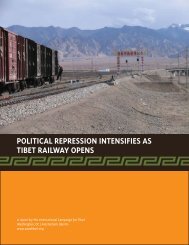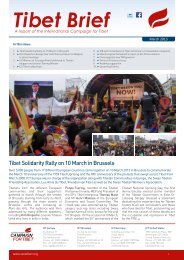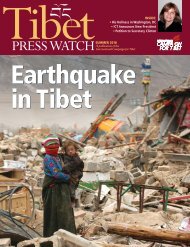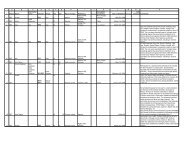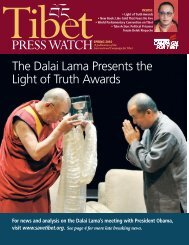download the report - International Campaign for Tibet
download the report - International Campaign for Tibet
download the report - International Campaign for Tibet
You also want an ePaper? Increase the reach of your titles
YUMPU automatically turns print PDFs into web optimized ePapers that Google loves.
INTERNATIONAL CAMPAIGN FOR TIBET<br />
ICT RECOMMENDATIONS ON TIBET<br />
THE UPRISING DURING THE SPRING OF 2008 and <strong>the</strong> continuing tensions in <strong>Tibet</strong><br />
result from <strong>the</strong> failure of <strong>the</strong> government of <strong>the</strong> People’s Republic of China to<br />
implement a system of genuine autonomy <strong>for</strong> <strong>Tibet</strong>ans concurrent with its<br />
campaign to dilute <strong>the</strong> <strong>Tibet</strong>an identity and, in particular, to constrain <strong>the</strong> practice of<br />
<strong>Tibet</strong>an Buddhism, of which devotion to <strong>the</strong> Dalai Lama is an integral element.<br />
A political solution is possible. Envoys of His Holiness <strong>the</strong> Dalai Lama and Chinese officials<br />
have been engaged in a dialogue since September 2002. Un<strong>for</strong>tunately, six years<br />
of sporadic dialogue have not progressed to substantive negotiations and have not<br />
met <strong>the</strong> expectations of <strong>the</strong> international community, including several heads of state,<br />
<strong>for</strong> meaningful progress towards a mutually-agreeable solution <strong>for</strong> <strong>Tibet</strong>.<br />
The <strong>Tibet</strong>an position in <strong>the</strong> dialogue is that <strong>Tibet</strong>ans be able to maintain <strong>the</strong>ir distinctive<br />
<strong>Tibet</strong>an identity into <strong>the</strong> future. Central to this position is <strong>the</strong> political right<br />
of autonomy provided to all <strong>Tibet</strong>ans living in contiguous <strong>Tibet</strong>an areas, an area<br />
roughly defined by <strong>the</strong> geography of <strong>the</strong> <strong>Tibet</strong>an plateau, governed by a single administrative<br />
unit under a single unified policy. According to <strong>the</strong> Chinese government’s<br />
own analysis of its law on regional ethnic autonomy, <strong>the</strong> <strong>Tibet</strong>an people are<br />
entitled to <strong>the</strong> full political right of autonomy:<br />
• full decision-making power in economic and social development undertakings;<br />
• freedom to inherit and develop traditional culture and to practice religious belief;<br />
• freedom to administer, protect and be <strong>the</strong> first to utilize natural resources; and<br />
• freedom to independently develop educational and cultural undertakings.<br />
Given <strong>the</strong> disappointing results of <strong>the</strong> dialogue, <strong>the</strong> instability in <strong>Tibet</strong> and <strong>the</strong><br />
unjustifiably and disproportionately harsh consequences <strong>for</strong> <strong>Tibet</strong>ans involved in<br />
<strong>the</strong> spring 2008 demonstrations, and <strong>the</strong> intensification of Chinese government<br />
campaigns against <strong>the</strong> influence of <strong>the</strong> Dalai Lama, ICT offers <strong>the</strong> following recommendations:<br />
141



